On July 4th and 5th the Second German Open Science Festival took place in Cologne where 160 visitors celebrated Open Science spreading the festival’s idea: Meet. Share. Inspire. Care.
Modelled after the Netherlands Open Science Festival and after the first successful German Open Science Festival 2022 in Hannover, it was time for the Open Sience Festival 2023 in Cologne – #OSF2023DE. And the response was great since with 160 registrations, the event was completely sold out.
Several local partners cooperated in the organisation: the University and City Library of Cologne (USB), the University of Cologne, the Institute for Biomedical Informatics (IMI), the Ageing Research Cluster of Excellence CECAD at the University of Cologne, and ZB MED – Information Centre for Life Sciences.
But before going into details get an insight into the atmosphere and flair of the festival with this aftermovie and pictures and get inspired!
On our ZB MED YouTube channel you can as well see the whole short interviews with the open science experts and enthusiasts about their motivation to join the festival and their thoughts on open science. Find the interviews in this playlist.
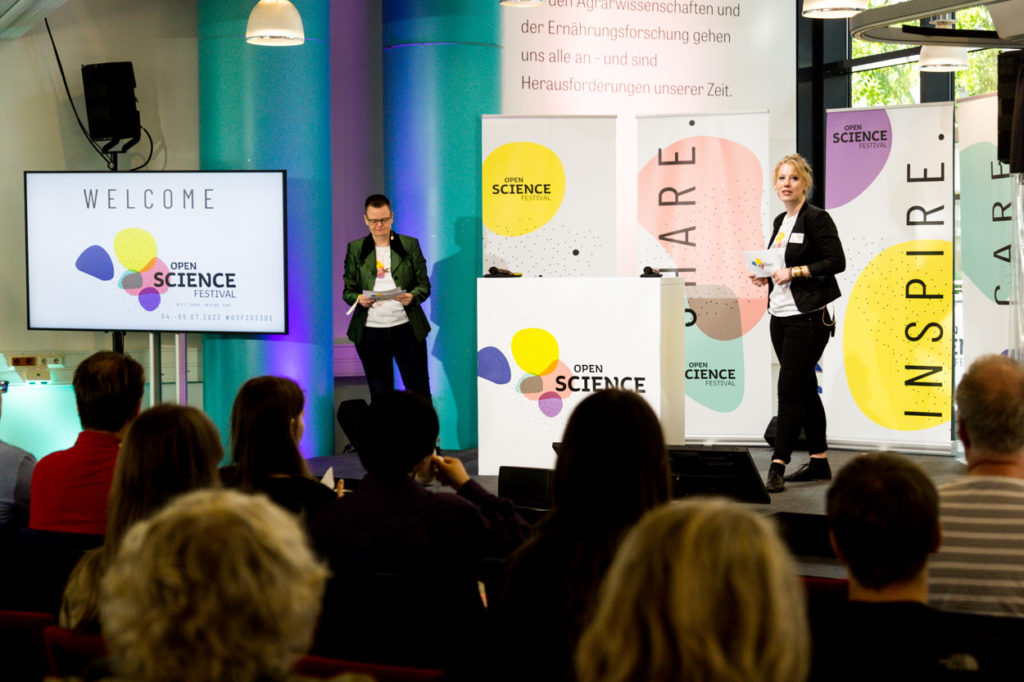
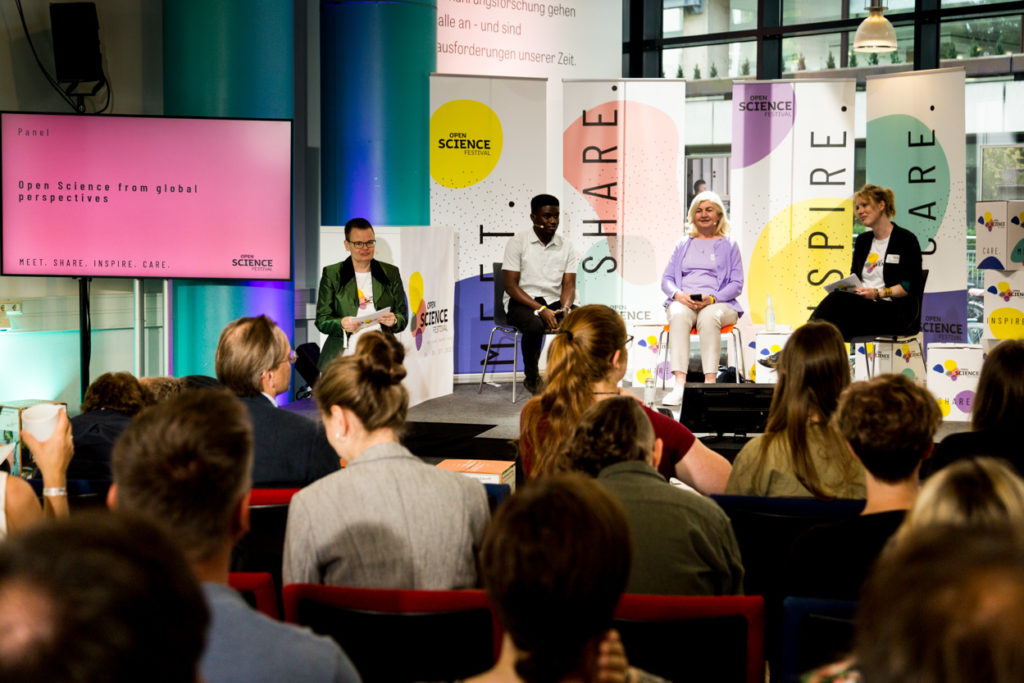
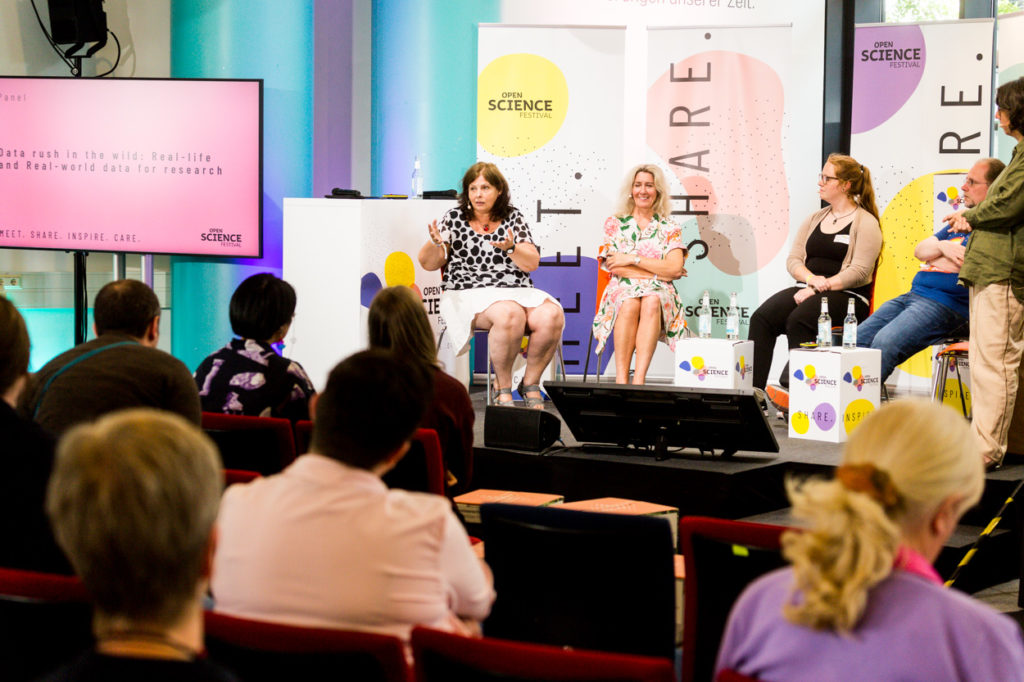
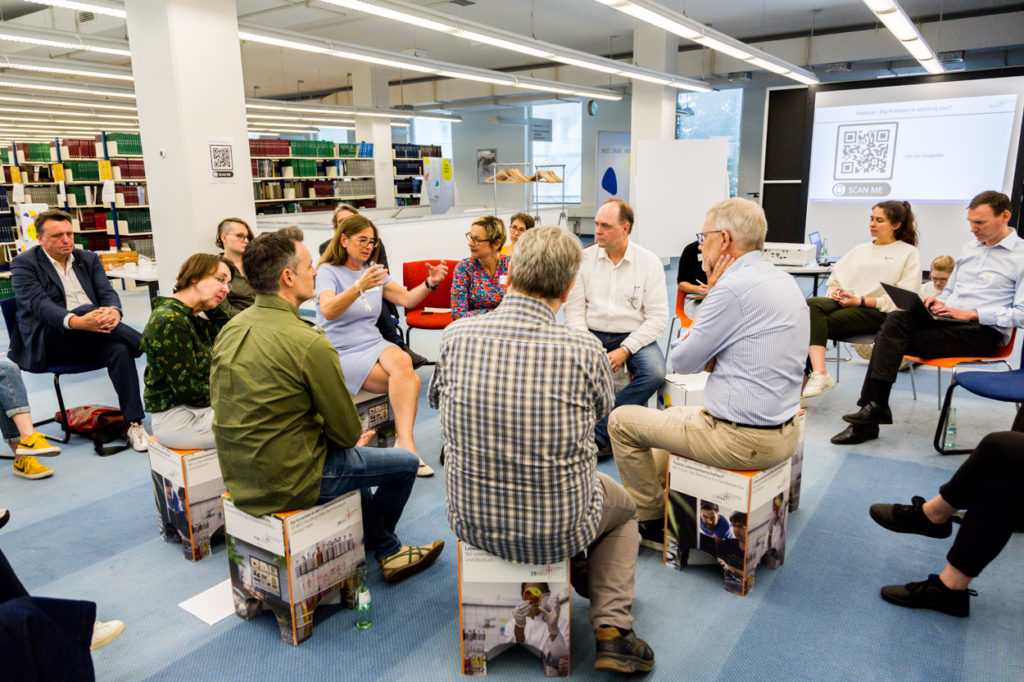
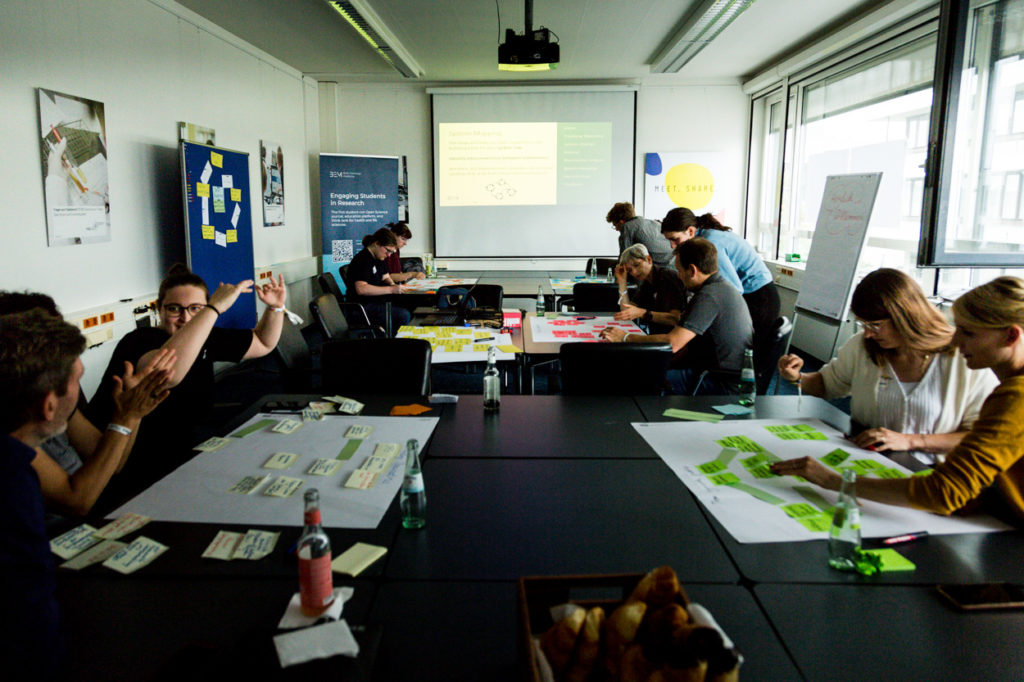
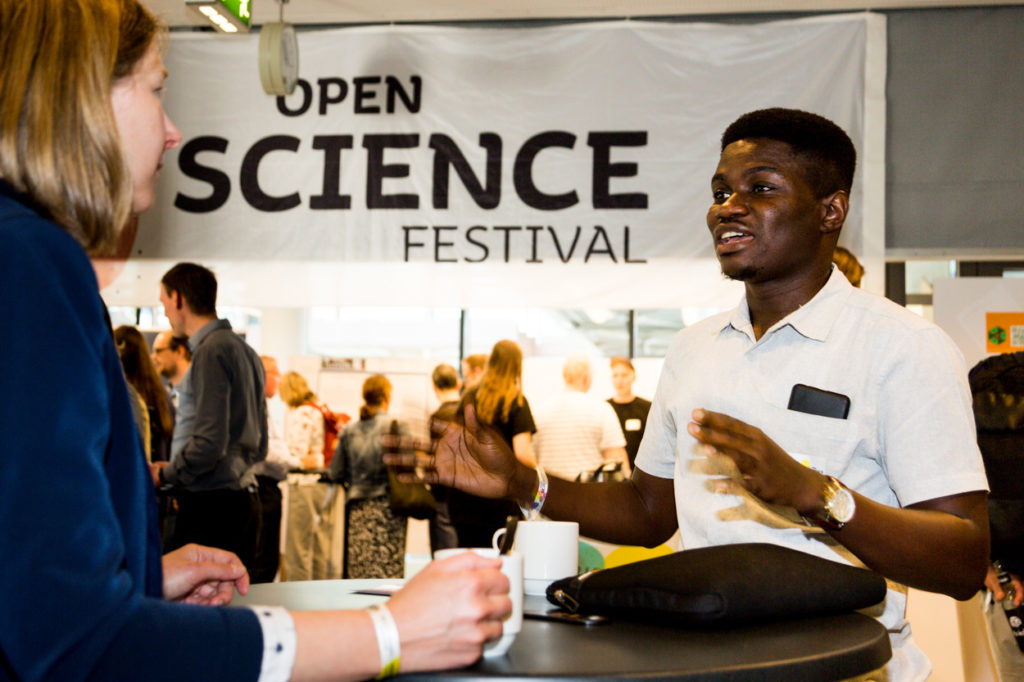
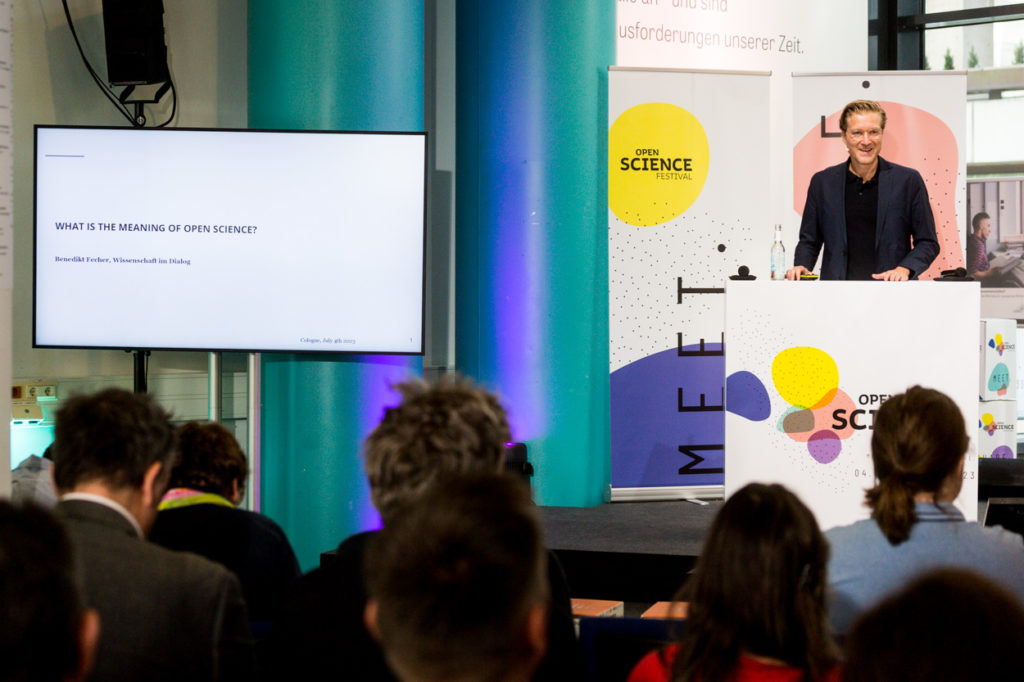
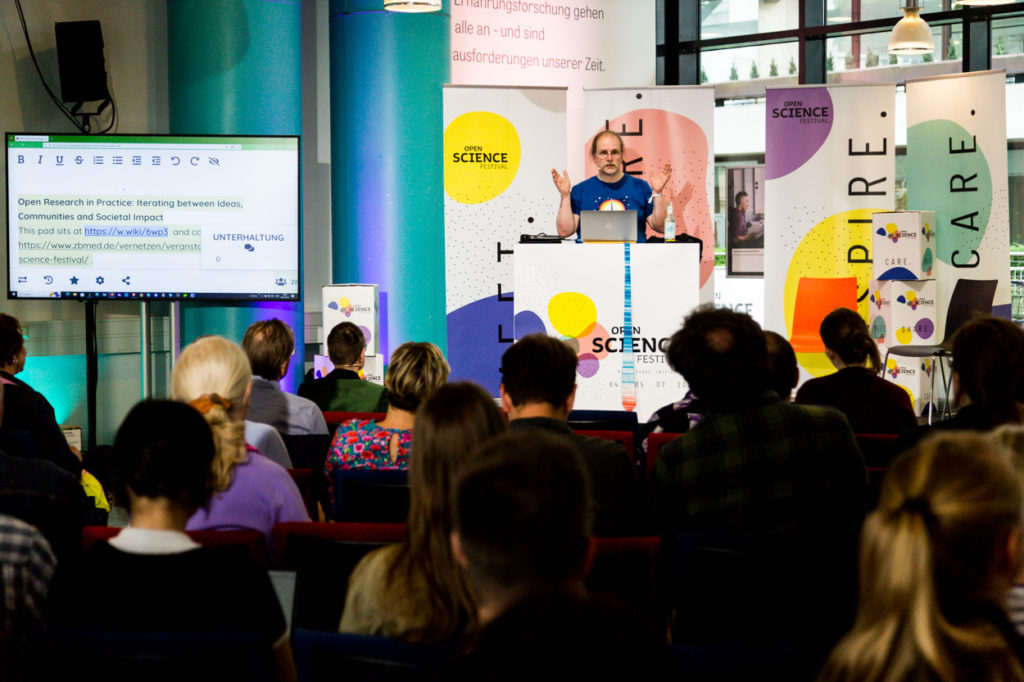
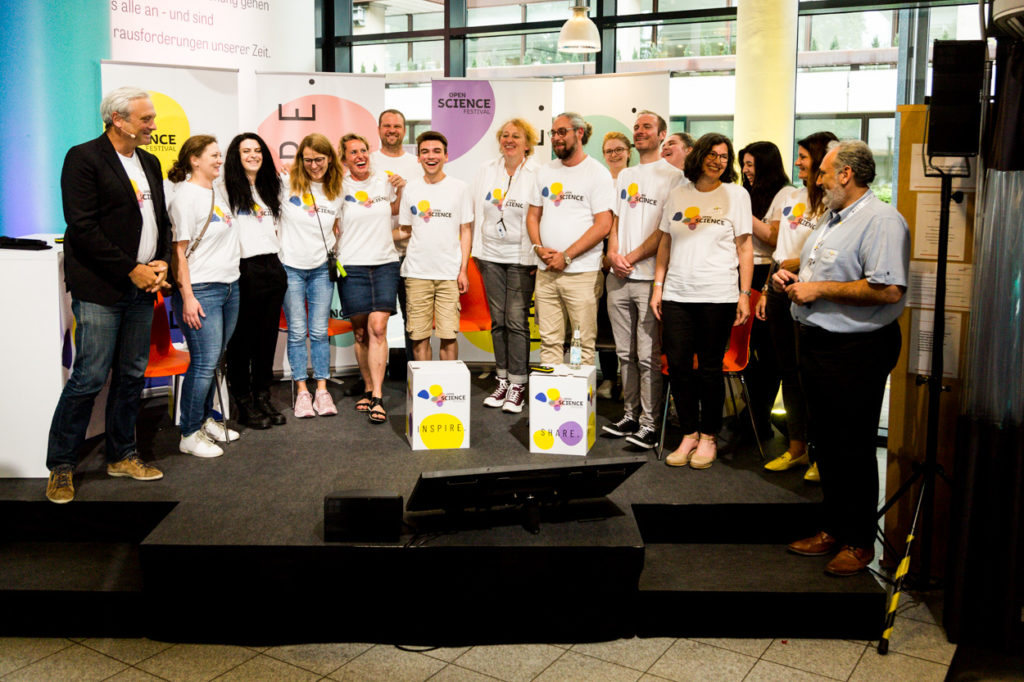
The programme of the Open Science Festival
It was a varied mix of keynote lectures, panel discussions, Ignite Talks, an open marketplace and numerous workshops! The line-up: national and international experts from the open science community. The star: open science in all its forms.
„What ist the meaning of Open Science?“ and „Open Research in Practice: Iterating between Ideas, Communities and Societal Impact“ – Keynotes
The first item of the programme at the Open Science Festival 2023 was the Keynote of Dr. Benedikt Fecher, (ORCID: 0000-0002-0982-196X) Managing Director at Wissenschaft im Dialog. The title of his keynote „What is the meaninig of Open Science?“ indicates the main question that the lecture aimed to explore, namely the different meanings of open science and their origin and development, ranging from a democratic movement to a neoliberal campaign. All of them so different that one could argue there was no meaning to open science at all, as Benedikt Fecher describes in the keynote’s abstract.
- Presentation DOI: 10.4126/FRL01-006453187
- Video recording
The second keynote was held on the second day of the Open Science Festival by Dr. Daniel Mietchen (ORCID 0000-0001-9488-1870) titled „Open Research in Practice: Iterating between Ideas, Communities and Societal Impact“. For his Keynote Daniel Mietchen chose an inteactive approach and encouraged the audience to participate directly in the keynote. For this purpose he set up an instant project on measuring the carbon footprint at ZB MED. In an Etherpad anyone in the audience could contribute own ideas and suggestions, comment on different approaches and come up with topics, criticism and questions. And quite incidentally, this demonstrated the possibilities open science and research can have in practice.
„Open Science from global perspectives“ and „Data rush in the wild: Real-world and real-life data for research“ – panel discussions
At our two panels we were glad to welcome several international experts on open science working in various fields and focusing on different aspects so that the audience could experience a lively discussion and dive in into the different angles. What they all had in common: passion and engagement for open science.
The first panel „Open Science from global perspectives“ concentrated on global aspects of open science – the conditions for research in the different parts in the world and the challenges researchers are facing practicing good research practice and following the spirit of open science. The two guests, Prince Edem Samoh from Ghan and Nino Pavliashvili, as well as further contributions from other scientists gave an exciting insight into the different perspectives during the panel discussion that was hosted by Dr. Eva Seidlmayer.
Read more about the panel and find more information to the discussion in this blog post.
The second panel „Data rush in the wild: Real-life and Real-world data for research“ was entirely dedicated to the topic of real-world data being the new oil. But what does the actual handling look like in practice? To find answers researchers from different communities with different experiences were invited:
- Prof. Dr. Oya Beyan (Biomedical Informatics Institute, Medical Faculty, Cologne University and University Hospital Cologne – ORCID 0000-0001-7611-3501),
- Edit Herczog (Director General, Vision & Values),
- Prof. Dr. Ingvill Constanze Ødegaard (GESIS – Leibniz Institute for the Social Sciences – ORCID 0000-0002-5481-3432),
- Julia Gehrmann (Biomedical Informatics Institute, Medical Faculty, Cologne University and University Hospital Cologne – ORCID 0000-0002-4101-5458) and
- Dr. Daniel Mietchen (FIZ Karlsruhe – Leibniz Institute for Information Infrastructure und Leibniz Institute of Freshwater Ecology and Inland Fisheries – ORCID 0000-0001-9488-1870).
Different topics such as opportunities and challenges along the research data cycle including data collection, sharing, ethics and interdisciplinary and international cooperation were discussed by the experts. They reported from their experiences in data sharing and reuse and what their struggles are when it comes to using real-world data in their daily work in order to learn from each other.
- Presentation Prof. Dr. Oya Beyan DOI: 10.4126/FRL01-006453205
- Presentation Edit Herczog DOI: 10.4126/FRL01-006453209
- Presentation Prof. Dr. Ingvill Constanze Ødegaard DOI 10.4126/FRL01-006453207
- Presentation Julia Gehrmann DOI 10.4126/FRL01-006453211
- Video recording
One Story on Open Science in five minutes on twenty slides – Ignite Talks at the Open Science Festival 2023
During the planning of the festival, the organizers were looking for new formats for the celebration of open science and came across Ignite Talks. This format was very well received by the audience. So what is an Ignite Talk? And what were the Ignite Talks at the festival about?
Read more about this programme item and the topics that were presented in this blog post.
From „System changes in sight?! Exploring the complexity of crediting for Open Science“ to „Open Enzyme“ – workshops at the Open Science Festival 2023
The 13 hands-on workshops, spread over the two festival days and held partly in German and partly in English, gave visitors the opportunity to learn new things and enter into current debates and provided new impulses. They dealt with a wide variety of topics:
The workshop „Managing the data landscape: A case for data stewardship“ for instance aimed to bring together various perspectives on data stewardship and to consider current data stewardship models through the lens of real world situations. Read more about this workshop in the following blog post.
In the workshops „Python Introduction for Research Analysis – Carpentries style“ the participants learned the basics of programming with Python. It aimed at reproducible data analysis with the Python Library Pandas. Read more about this workshop in the following blog post.
Another workshop also dealt with the handling of research data. The workshop „FDM: Warum ich einen Datenmanagementplan nicht nur für Förderer schreibe“, in English „RDM: Why to write a research data management plan not only for the funding“, aimed to introduce participants to this topic, which is increasingly becoming the focus of research data management. Read more about this wirkshop in the following blog post (in German).
One topic addressed from different angles in several workshops was the question of the connection between open science and reputation. „System changes in sight?! Exploring the complexity of crediting for Open Science“ was one of them, hosted by Felix Hambitzer, Amelya Keles and Raphael Leuner from Berlin Exchange Medicine (BEM). This workshop looked closely at the still prevailing crediting system of researchers that depends less on the quality of their research, and more on the quantity of their publications and the reputation of the journal in which they were published and the upcoming discourse about whether there should be further sientific assessments to evaluate research and how they should like.
The workshop „Open Science und wissenschaftliche Reputation“, hosted by Dr. Jasmin Schmitz, Dr. Ralf Depping and Michael Geuenich, also dealt with the criteria by which research should be evaluated. Find the presentation of this workshop here: DOI 10.4126/FRL01-006453197.
Finally, the workshop „I am more than my h-index! Eine Einführung in das Thema Responsible Metrics“ looked specifically at the two metrics h-Index and Journal Impact Factor (JIF) and explored how a path towards „Responsible Metrics & Research Assessment“ can look like and in which context indicators can be helpful in the evaluation of research.
Other workshops at the Open Science Festival 2023 dealt with topics such as open acces publishing, for example in the workhops about German Medical Science (GMS) „20 Jahre GMS: Qualitätssicherung für Open Access“ (to the presentation: DOI 10.4126/FRL01-006453203), the challenges of organizing knowledge in the future as for example in the workshop „The Open Research Knowledge Graph – A Lighthouse in the Publication Flood“ (to the presentation: DOI 10.4126/FRL01-006453199) or the threats that posed by science tracking in the workshop „Big Publisher Is Watching You? – Science Tracking“ (to the presentation: DOI 10.4126/FRL01-006453201).
You can find all workshops and their abstracts in the programme of the Open Science Festival 2023 on the website.
Explore: Documentation of the Open Science Festival 2023
Of course, there is much more to say about the festival and all the discussions and impulses on the topic of open science than it would be possible to reproduce here in this article. A look at the graphic recordings by Maren Colett, who accompanied the festival and captured it in her drawings, might give you an idea of how wide-ranging the festival was – a small insight:
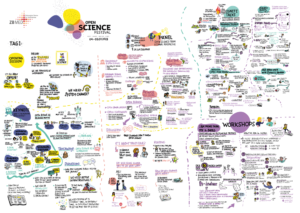
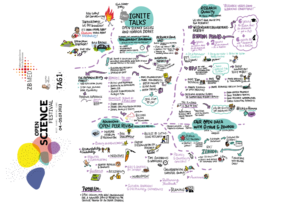
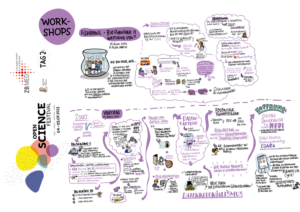
Find all publications and further information here:
- Marketplace at the Open Science Festival:
All exhibitors and information about the projects or initiatives with a foucus on open science presented at the market place can be found here. - Video recordings:
Find all the recordings of the festival on the ZB MED YouTube channel in this Playlist. - Presentations and posters:
Find all published presentations and posters in the PUBLISSO – Repository for Life Sciences. - Report on the Open Science Festival:
Find a feature about the festival, written by Vera Münch and published in b.i.t. online, here. (in German)
Last but not least: Open Science Festival 2024 – #OSF2024DE
If you missed the second German Open Science Festival #OSF2023DE, or, of course, if you want to experience another festival like this and meet the open science community, then you should make a note:
There will be a third edition of the German Open Science Festival, this time in Mainz – the Open Science Festival 2024 #OSF2024DE.
Save the Date: September 17 and 18, 2024!
DOI (Digitalausgabe): https://doi.org/10.48664/phq5-j277
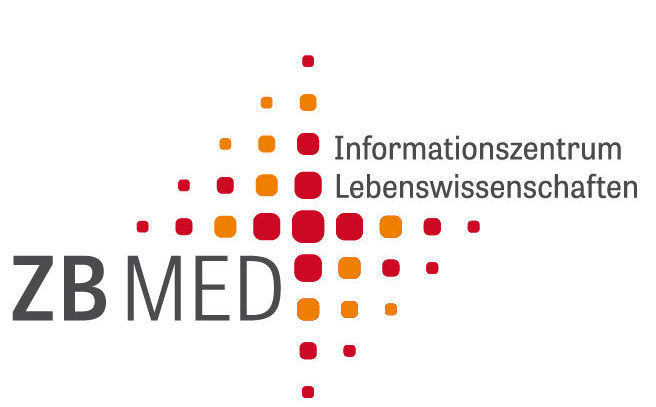


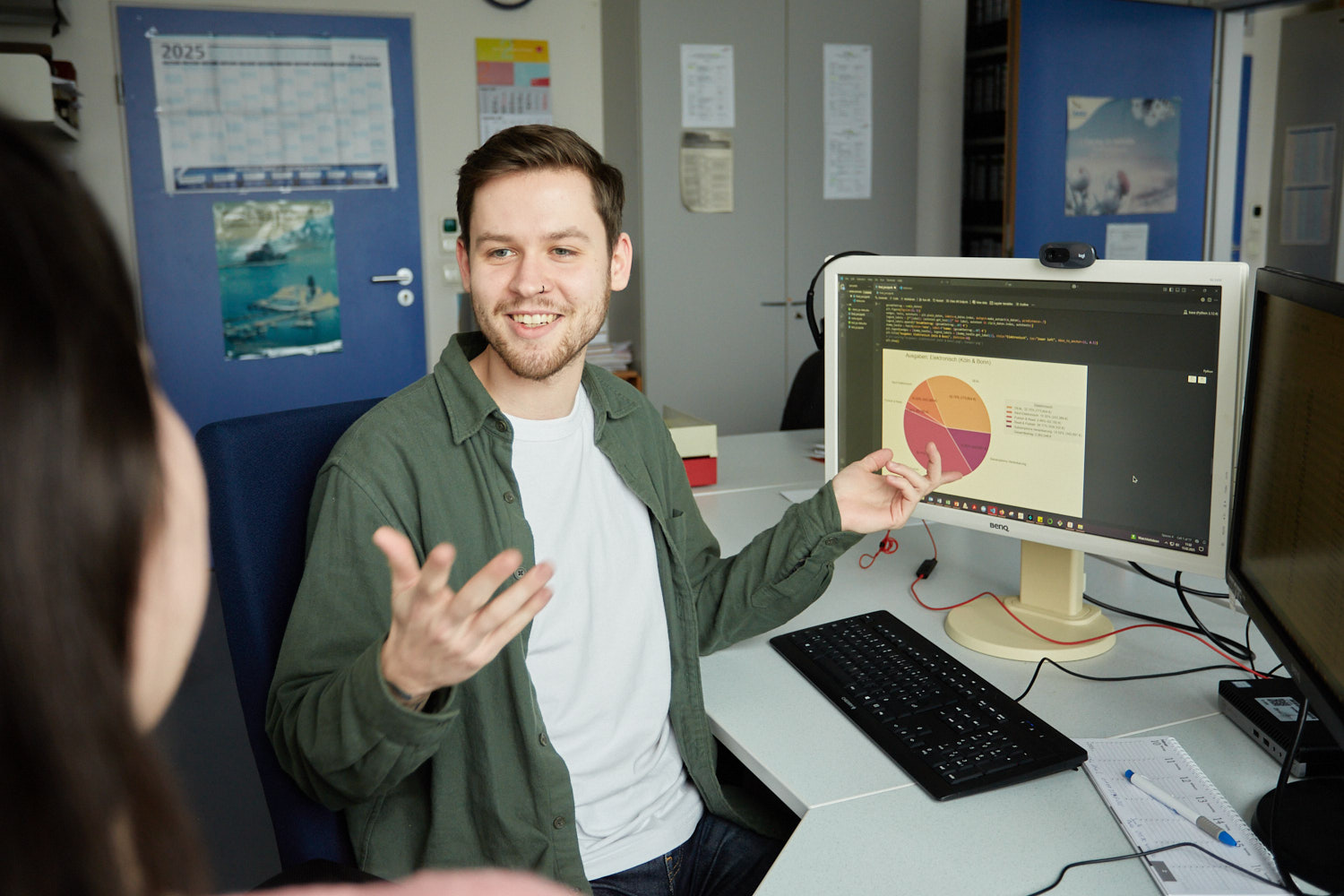
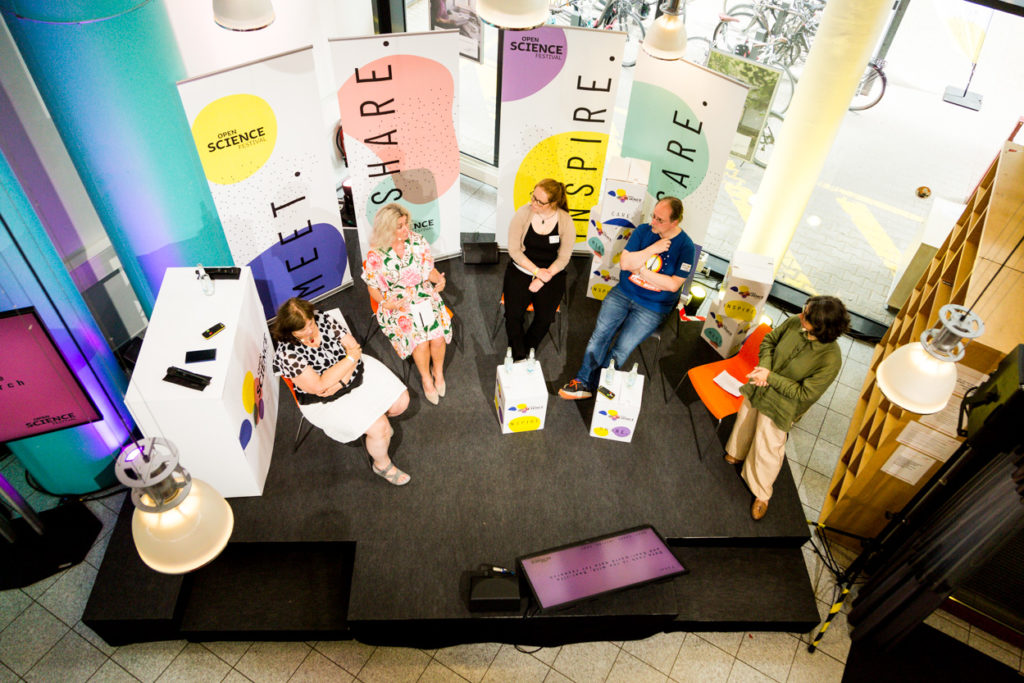
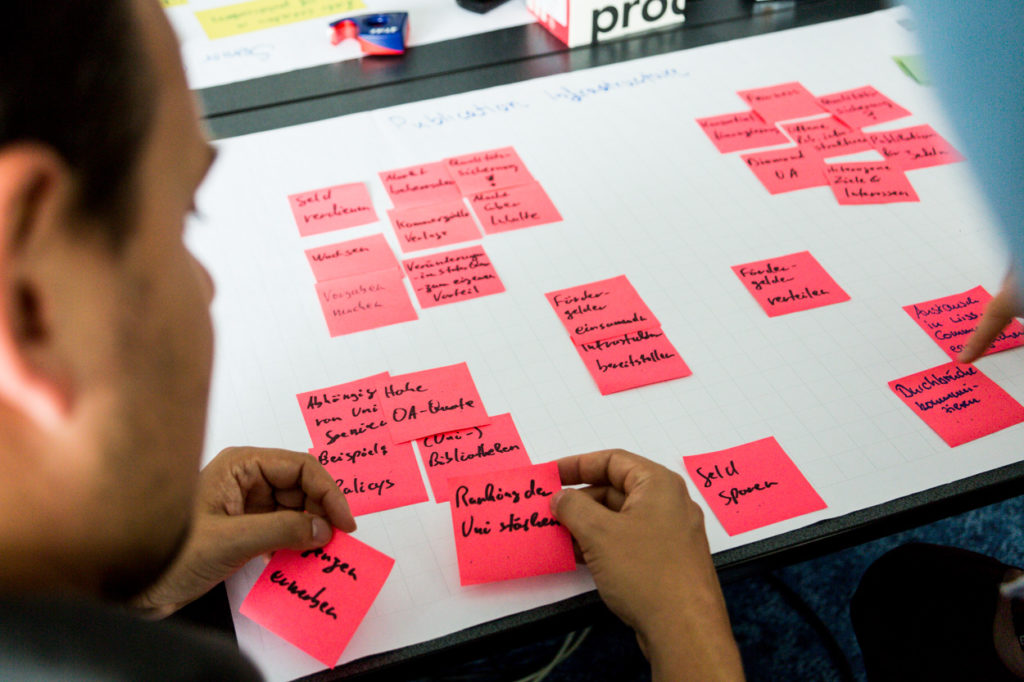
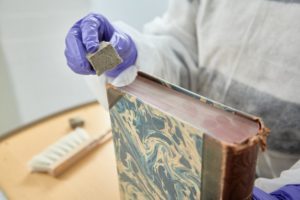
Pingback: Open Science from global perspectives: Open Science Festival Panel
Pingback: Ignite Talks: Open Science Festival 2023 – ZB MED-Blog
Pingback: Managing the Data Landscape - a Case for Data Stewardship: Workshop at the Open Science Festival – ZB MED-Blog
Pingback: Warum ich einen Datenmanagementplan schreibe
Pingback: An insight into Python: Workshop at the Open Science Festival – ZB MED-Blog
Pingback: Die Grenzen des Möglichen verschieben oder: Ein Jubiläum kommt selten allein – ZB MED-Blog